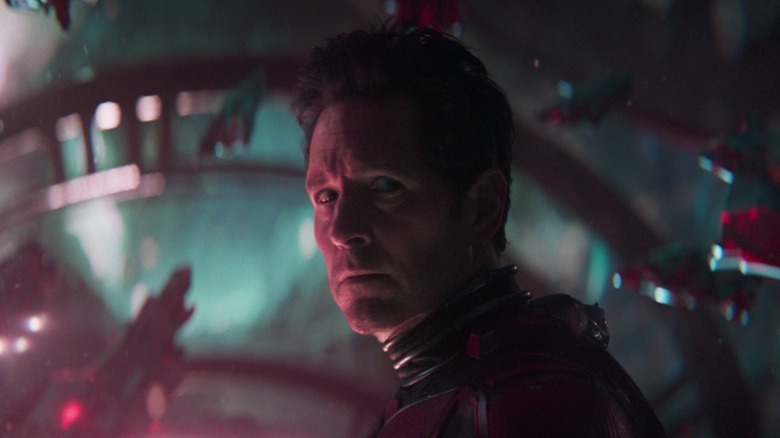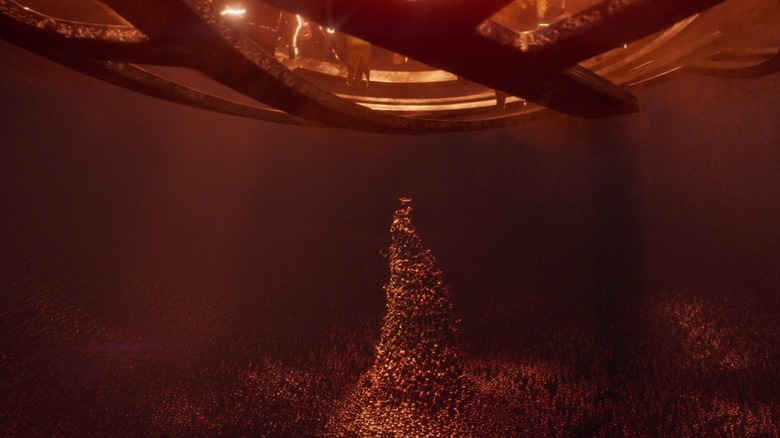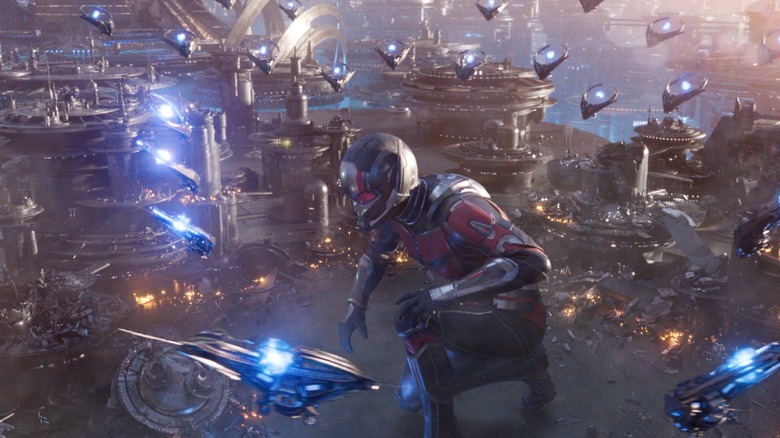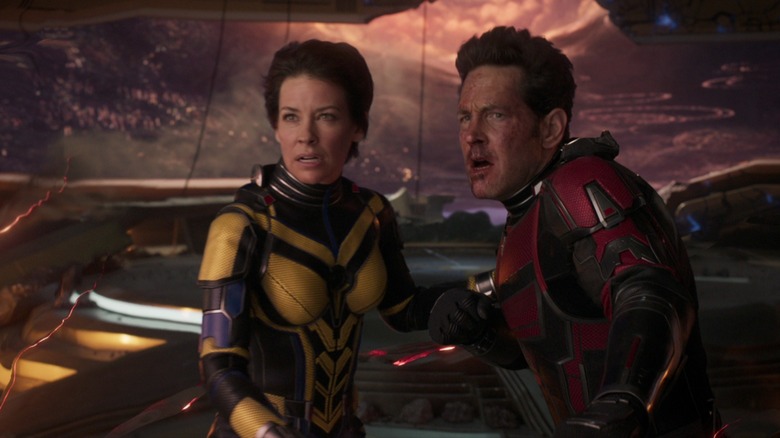Ant-Man And The Wasp: Quantumania Ending Explained: Maybe Size Really Does Matter
The following article contains major spoilers for "Ant-Man and The Wasp: Quantumania." Proceed at your own risk!
After the relatively small-scale adventures of Paul Rudd's Scott Lang and the rest of his ant-gang in the first two "Ant-Man" movies, "Ant-Man and The Wasp: Quantumania" promised to shake things up significantly. Gone are the familiar streets of San Francisco, the fast-talking joys of Michael Peña's Luis, and the very idea of an "Ant-Man" movie serving as a reset button and a palate cleanser to the Avengers-sized storylines of the rest of the Marvel Cinematic Universe. Instead, this threequel now kicks off the entirety of Phase 5, (re)introduces the next Thanos-level big bad in Jonathan Majors' Kang the Conqueror, and has essentially positioned itself as an unmissable event film for those who want to make sense of the rest of the movies (and Disney+ shows) to come.
The startlingly mixed-negative response to the film (you can check out /Film's review by Jeff Ewing here) might indicate that this reconfigured approach to Marvel's smallest superhero hasn't gone over quite as well as intended. Would Kevin Feige, director Peyton Reed, and the rest of the creative team been better served keeping Ant-Man, Evangeline Lilly's Wasp, and the rest of their cohorts relatively free from the interconnectedness of the saga? Was the idea of differentiating this mini-franchise from all the rest by focusing on its ground-level family drama actually the key to its success? In other words, did expanding "Ant-Man and The Wasp: Quantumania" into a vital aspect of the MCU's current trajectory actually do more harm than good?
The ultimate answers to those questions aren't for any one person to unilaterally decide, but we can at least look at how the ending of the film plays into — or refutes — those concerns.
Feeling a little heist-y
Okay, maybe it's a misconception to say that "Quantumania" is a complete left-field turn for the franchise. While the plot holds all sorts of ramifications for the wider world of the MCU, the heart of the story remains entrenched in Scott Lang's attempts to repair the estranged relationship with his daughter, Cassie (Kathryn Newton). Before Kang shows up, the film follows a very similar structure to past Ant-Man adventures, where the diminutive hero remains mostly concerned with securing his family's safety at all costs. And even after Kang arrives on the scene and completely upends the stakes of the story, the script gives us one thrilling throwback sequence to the previous two "Ant-Man" movies that propels "Quantumania" into its final act: a heist.
After Cassie's experiments into exploring the Quantum Realm go horribly wrong and signals a potential way of escape to the banished Kang inside, our heroes find themselves trapped in this microscopic world — with only Janet Van Dyne (Michelle Pfeiffer) having any expertise whatsoever of the threats they'll soon face. Hopelessly split up into two separated groups, it's only a matter of time before the creepy MODOK (that's Mechanized Organism Designed Only for Killing, natch) descends upon them, reveals himself as a returning, deformed Darren Cross (Corey Stoll) from the 2015 movie, and delivers Scott and Cassie right into the menacing hands of Kang.
Having spent years exiled in the Quantum Realm after Janet's sabotage of his multiverse-traveling ship, Kang finally sees a way out ... and he'll need Scott's help. Blackmailed into recovering the power core that Janet used Pym Particles to put beyond Kang's reach, Scott ventures down in the film's trippiest sequence and, with some timely help from Hope (and, uh, himself?), barely makes it back unscathed with the power core in hand.
Ant-Man: Endgame?
Of course, that's only the beginning of our heroes' Kang-related problems. A tense standoff quickly ensues when Kang arrives to take back the power core that once allowed him to travel the multiverse at whim, laying waste to countless worlds and destroying untold numbers of innocent lives. In his fiercest display of power yet, he easily dispatches Ant-Man, the Wasp, and Janet and returns to his base of operations in the Quantum Realm. It's from here that he plans an all-out assault to expand his empire from the microscopic world to, well, everywhere else that he was once banished from.
It's also here where "Quantumania" veers into genuinely "Avengers"-sized territory. The third act of the film sees our heroes scramble to thwart Kang's plans before he can unleash the full might of his power on the world they hold dear, but to do so involves waging their own war against him with the help of the oppressed freedom fighters scattered throughout the Quantum Realm (led by Katy M. O'Brian's Jentorra, William Jackson Harper's telepathic Quaz, and, of course, the squishy Veb, voiced by David Dastmalchian). While Cassie hijacks Kang's broadcast system to send out the call to arms throughout all corners of the Quantum Realm, the rest of our heroes rely on brute force to break through Kang's defenses ... to mixed results.
To be clear, there's never anything inherently wrong with spectacle, but this portion of the film largely trades in the humor, character work, and small-scale appeal of Ant-Man in favor of what essentially feels like a lesser "Avengers: Endgame" redux. Crammed with an overabundance of CGI-ridden explosions and frenzied subplots that never give any one moment time to shine, it's hard not to feel numbed by the nonstop action on display.
Pulling punches
Admittedly, the mayhem of Kang's forces taking on the freedom fighters of the Quantum Realm builds to a number of charming (though maybe not entirely earned?) payoffs. Hank Pym (Michael Douglas) unleashes the ants who were sucked into the Quantum Realm along with our protagonists, who have built an advanced civilization capable of superhuman feats. (As the prophecy once foretold: Ants!) Meanwhile, MODOK undergoes his own crisis of conscience. Convinced by Cassie to become less of a "dick," the big-headed mech makes up for his villainous ways by turning on Kang at a crucial moment and allows Hank's ant army to gain the upper hand. Even Veb gets his moment to shine!
It leads to the defeat of Kang's forces and his final confrontation with Scott as he attempts to escape back home. With everyone else already through the reactivated portal, Scott prepares to sacrifice his own journey back home to keep Kang trapped in the Quantum Realm. Lang seems resigned to his fate ... until Hope heroically returns to throw more Pym Particles at the power core, send Kang to his (presumed) shrinking-induced death, and help Scott save the day.
Here, it seems like "Quantumania" might actually opt for a bold ending where our title characters pay a costly sacrifice and stay lost in the Quantum Realm for the time being, but nope! Conveniently, Cassie opens up another portal and whisks them back home only moments later. Only Scott's nagging feeling that Kang may have gotten exactly what he wanted leaves audiences on a potentially uncertain note, but even that's brushed aside. It all ends on a self-satisfied, "Tune in next time on the MCU!" anticlimax.
"Quantumania" sacrifices the trilogy's breezy, fun-loving tone for just another whizz-bang blockbuster that leaves us wanting more ... or, rather, less.



